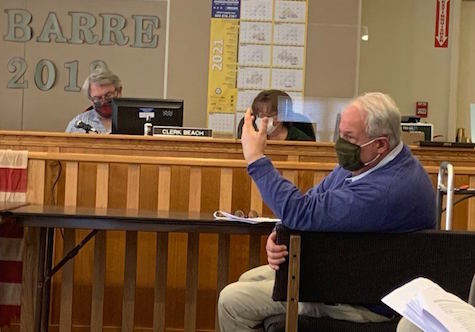Barre hears some concerns over updated regs for large-scale solar

Photo by Tom Rivers: Lance Mark, Barre town attorney, responds to a question during last week’s Town Board meeting, which included a public hearing on a local law for solar energy systems. Town Supervisor Sean Pogue is in back next to Town Clerk Maureen Beach.
BARRE – The Town Board has proposed a local law for solar energy systems that doesn’t require setbacks for contiguous parcels with the solar projects.
Barre is proposing 50-foot setbacks from property lines of adjacent landowners without solar panels.
The southwestern part of the town near the wildlife refuge is being considered for an 1,800-acre solar project that would include part of the neighboring town of Shelby.
Community Energy wants to build a 200-megawatt project, Orleans Solar LLC. The company said it expects to submit a formal application next month to the state’s Office of Renewable Energy Siting (ORES). The state agency has the final say in approving the projects, but is expected to see how the projects fit with local zoning laws.
Barre officials say their local law is intended to facilitate solar projects while minimizing impacts on neighboring properties.
Two residents last week urged the town to require bigger setbacks from neighboring property – 250 feet instead of 50 feet. The projects would have to be 250 feet away from a neighboring structure. The solar panels need to be at least 100 feet away from buildings on the same lot.
Mark Lindberg and Charles McAllister said the solar arrays should be farther away from the next-door neighbors.
“It’s an industrial installation,” McAllister said during a public hearing last week at Barre Town Hall.
McAllister and Lindberg said the 50-foot setback would limit the neighbors in hoe the use their property. For example, neighbors of the projects – with only a 50-foot setback – could later decide to build on their property and could have the solar panels closer to a new structure than 250 feet.
Another resident responded the 250-foot setback from neighbors’ property lines would require a bigger footprint for the project, with companies needing to lease more land. The 50-foot setback is also consistent with the zoning guidelines in many other communities.
Lindberg said the solar panels are “ugly” and should be farther from neighbors than 50 feet, and also need to be adequately screened. That doesn’t mean a row of “scrawny trees,” Lindberg told town officials during the public hearing.
The solar companies are spending “millions and millions of dollars” on large-scale solar projects and can afford to have berms, shrubs, trees and fencing, Lindberg said.
Town Supervisor Sean Pogue said the review process with the state, including the Department of Environmental Conservation, requires companies to do visual impact studies and do visual screening “to the maximum extent possible.”
The town’s proposed zoning update will be reviewed this evening by the Orleans County Planning Board, which is expected to offer recommendations.
Town attorney Lance Mark acknowledged the state through ORES could disregard the town’s local law for setbacks and other regulations for the projects.
“Unfortunately we don’t have a lot of influence with ORES,” Mark said.
But Lindberg said the town should still put in the local law protections for the community, including the neighboring property owners.
“We can say this is what we want, even if they squash us like a bug,” Lindberg said about the state agency.
Some other highlights of the local law:
- The zoning code also sets the maximum height of the solar panels to 12 feet, measured from the base of the solar rack to the top of the rack. However, the town has the authority to increase that height by 8 more feet if viewed as necessary “to accomplish the purposes they are intended to serve.”
- Perimeter fencing also shouldn’t exceed 7 feet in height.
- Solar installations need to be at least 120 feet from any public roads (measured form the center of the road), and 500 feet from all property lot lines from schools or parks.
- Solar company needs to maintain a decommissioning bond throughout the life of the project at 125 percent of the decommissioning cost.
- The company needs to enter into a host community agreement with the town and pay Barre an annual fee to compensate the town “for expenses or impacts on the additional agreements with the applicant as may be necessary to protect the town and its citizens’ interest (E.G., separate road use, or decommissioning agreement).” The host community agreement shall be in addition to any payment in lieu of taxes which may be authorized to be collected by the town.
- Barre also will require the solar energy companies to have an escrow agreement to pay the town’s costs for engineering and environmental review and legal expenses for the projects.







































































